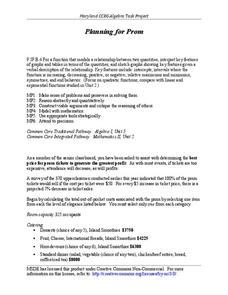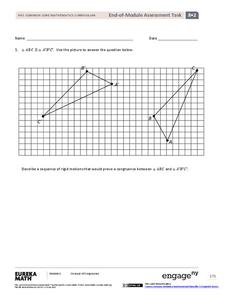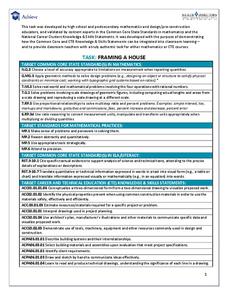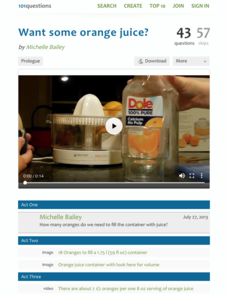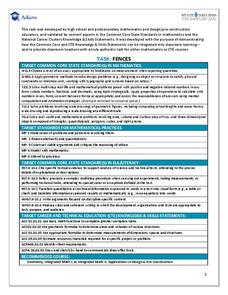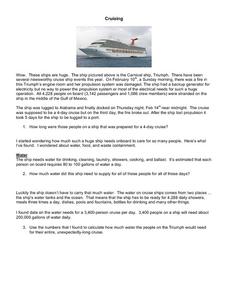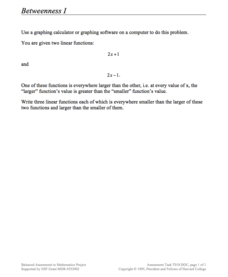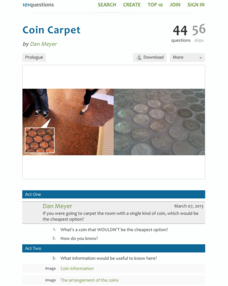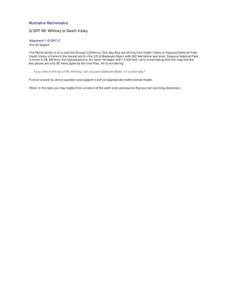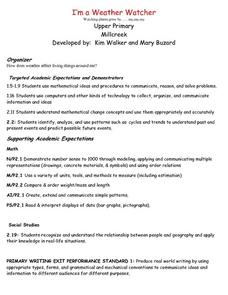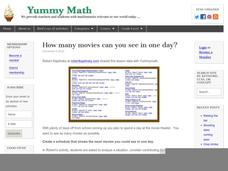101 Questions
Jam Session
Don't let the learning in your classroom get jammed up! Intrigue your scholars with an open-ended scenario to explore. A video presentation shows a challenging stretch of road that is susceptible to traffic jams. The task is to determine...
EngageNY
Congruence, Proof, and Constructions
This amazingly extensive unit covers a wealth of geometric ground, ranging from constructions to angle properties, triangle theorems, rigid transformations, and fundamentals of formal proofs. Each of the almost-forty lessons...
Howard County Schools
Planning for Prom
Make the most of your prom—with math! Pupils write and use a quadratic model to determine the optimal price of prom tickets. After determining the costs associated with the event, learners use a graph to analyze the break even point(s).
EngageNY
End-of-Module Assessment Task - Grade 8 Mathematics (Module 2)
Can your classes apply the knowledge they have learned? Use this performance task to find out! Individuals use transformations to explain congruence and angle relationships within parallel lines to find missing values. They show what...
5280 Math
Factory Functions
Solve a real-life problem using function-building skills. Presented with an open-ended question, scholars complete a checklist to create and justify a solution in an interesting algebra project. The checklist asks for justifications of...
Achieve
Framing a House
If members of your class wonder where they can use the math they learn in middle school, let them discover the answer. Learners apply geometry concepts of scale and measure to calculate the costs of framing a house addition.
Achieve
Corn and Oats
How much land does a parcel hold? How much fertilizer does it take for a field of corn? Pupils answer these questions and more as they apply ratio reasoning and unit analysis.
101 Questions
Want Some Orange Juice?
Juice up your lessons with an open-ended resource. Scholars must determine how many oranges it takes to fill a container with juice. They use information presented in a video and as images to find the solution.
Achieve
Fences
Pupils design a fence for a backyard pool. Scholars develop a fence design based on given constraints, determine the amount of material they need, and calculate the cost of the project.
101 Questions
Banana Bread Baker
You don't want to be short bananas when making bread. Scholars use their math skills to make sure there are enough bananas to go around. Using measurements given in a recipe, they must determine how many bananas they need to increase the...
Illustrative Mathematics
Field Day Scarcity
Introduce young mathematicians to concepts of financial literacy with this open-ended word problem. With seven dollars to spend during field day and given a list of available items and their prices, children must determine how they want...
Curated OER
Cruising
Cruise ships offer many engaging opportunities for real-world math adventures. These large, floating cities use resources with numbers into the thousands place. Young mathematicians are asked to calculate numerical information...
Concord Consortium
Betweenness I
Just between us, this is a pretty cool lesson! Given two functions with the same slope, learners write three new functions whose outputs are all between the given functions. The question is open-ended, allowing pupils to explore the...
Concord Consortium
Betweenness IV
Challenge your classes to think between the curves. Given two function formed by the combination of two exponential functions, individuals must write three functions in which all values would lie between the given. The question is...
Balanced Assessment
Number Game
It's all in the numbers! Create a mathematical model to analyze a number game and develop a winning strategy. Using a given numerical pattern, scholars write an expression to model the scenario. They then interpret the pattern of the...
Balanced Assessment
Initials
Learners explore the meaning of groups formed through permutations and combinations with an activity that asks individuals to determine the total number of pupils needed to guarantee that at least one pair has the same initials....
101 Questions
Coin Carpet
Here's a new meaning to the expression throwing away money...a carpet of coins! An intriguing lesson requires calculations to determine the coin that would be the cheapest option, but it's a little tricky. The cost of the coin...
Curated OER
Mt. Whitney to Death Valley
This is an intriguing problem that brings together real-world data, technology, and mathematical problem solving. If visibility wasn't an issue, could you see from the highest point in the lower 48 states, Mt. Whitney, to the lowest...
Curated OER
I'm a Weather Watcher Watching plants grow by......my,my,my
Students investigate how weather affects how plants grow. They collect data on weather and plant growth for a week and display the data on a graph. For a culminating experience they design a movie using software that shows plant growth...
EngageNY
Ptolemy's Theorem
Everyone's heard of Pythagoras, but who's Ptolemy? Learners test Ptolemy's Theorem using a specific cyclic quadrilateral and a ruler in the 22nd installment of a 23-part module. They then work through a proof of the theorem.
5280 Math
Multiplication Table Algebra
Patterns, patterns, everywhere! Young scholars examine the multiplication table to identify patterns. Their exploration leads to an understanding of the difference of squares and sum of cubes by the completion of the algebra project.
Balanced Assessment
Disc-Ness
Transform your scholars into mathematicians as they develop their own geometric definition. The task asks individuals to compare cylindrical objects and create a definition for the disc-ness of each object. They may use any method and...
Curated OER
How many movies can you see in one day?
For kids who love movies, figuring out a schedule for the maximum number that can be seen in one day is not only a good demonstration of Common Core mathematical practices, but also a highly motivating activity. Robert Kaplinsky...
EngageNY
Why Do Banks Pay YOU to Provide Their Services?
How does a bank make money? That is the question at the based of a lesson that explores the methods banks use to calculate interest. Groups compare the linear simple interest pattern with the exponential compound interest pattern.


